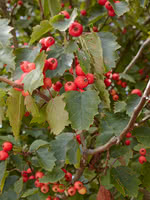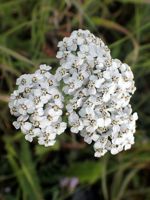Mon-Fri 9am - 5pm Mountain time
Arnold Hawthorn vs Yarrow
Crataegus arnoldiana
Achillea borealis (Previously Achillea millefolium)
NOT AVAILABLE THIS SEASON
NOT AVAILABLE THIS SEASON
(new stock expected: fall of 2026)
Arnold Hawthorn is a low-branched tree favored by wildlife and landscapers. This tree's beautiful white flowers and bright red berries make it an attractive ornamental in anyone's yard. Arnold Hawthorn is also used in windbreaks and riparian planting.
Despite its thorns, Arnold Hawthorn is a popular choice of food and shelter for deer and birds. Humans can also eat these berries fresh or preserved, but Arnold Hawthorn will not have high yields until it matures at 5-8 years.
Yarrow is a herbaceous, native wildflower that is found across Canada. It features large, flat clusters of tiny white flowers. The blooms attract a variety of pollinators, making it an ideal choice for pollinator gardens. While partial shade is tolerated, the best flowering occurs in full sun. Yarrow is resistant to deer and rabbits, making it both a beautiful and practical addition to your landscape.
The entire plant is edible, but leaves and flowers are most commonly consumed. They have a strong licorice scent and a mild sweet flavor that is similar to tarragon. Yarrow leaves can also be used as a natural insect repellent.
It is important to plant Yarrow in the right place, it can spread quickly via both rhizomes and self-seeding. Deadheading the spent flowers will extend the bloom season and can help limit self-seeding.
Arnold Hawthorn Quick Facts
Yarrow Quick Facts
Toxicity: toxic to dogs, cats, and horses

